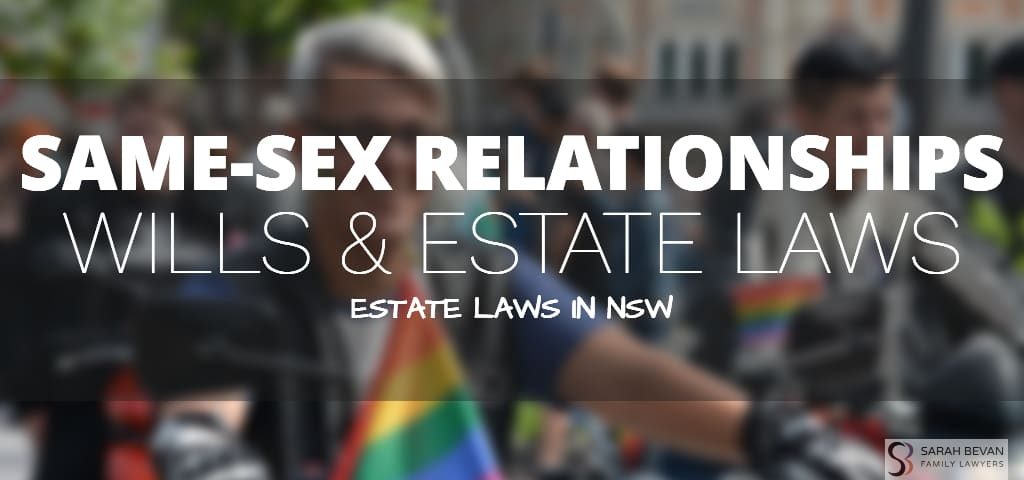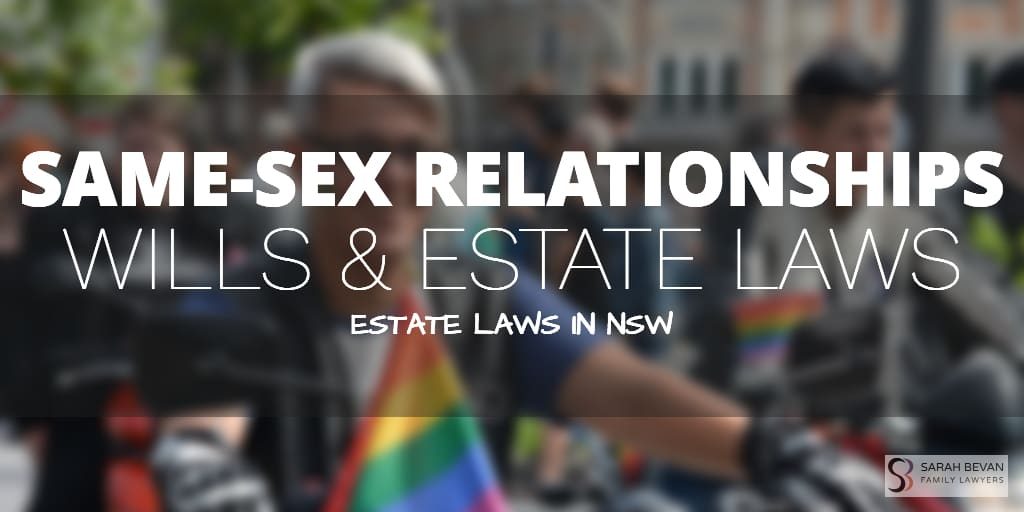- Sydney Family Lawyers
- (02) 9633 1088
- mail@sbfamilylawyers.com.au
Same-Sex Relationships Wills & Estate Lawyers
Same-Sex Relationship Wills and Estates in NSW
The laws concerning wills and estates are complex and require an expert family lawyer to provide high quality and accurate advice and legal services to ensure a person’s interests are protected and their assets are properly administered.
Wills and estates include the administration of various essential legal instruments including Wills, Powers of Attorney, Grants of Probate and Letters of Administration.
With the legalisation of same-sex marriage, it is essential that any same-sex couple that becomes married ensure their legal interests are properly updated to accurately reflect their wishes with the management and distribution of their assets at the appropriate time.
Same-Sex Wills and Estates Laws
Anyone over the age of 18 can make a Will. If a person is under 18 and has testamentary, they can make a Will. With the approval of the Court, a person under the age of 18 who is not married can make a Will.
‘Testamentary capacity’ refers to a person being able to understand the legal effect of a Will. They must also be aware of the extent of the relevant assets as well as the people who would normally be expected to benefit from the estate.
If a person dies without a Will, their estate will be distributed in accordance with an established legal formula. This may mean that a person’s estate passes to the government. If there is a mistake in the Will or uncertainty, the Court may decide the Will is not valid.
Where a person makes a Will and then becomes married, the Will is generally revoked unless it anticipated the marriage. Where a person divorces after they have made a Will, any gift to a former spouse is cancelled as well as the spouse’s appointment as executor, trustee or guardian of the Will. If the former spouse is appointed as trustee of property left on trust for beneficiaries who are children of the relationship, that appointment is not cancelled. Each of these issues requires specific legal advice and expert consideration.
In making a Will, you are entitled to leave your assets to whomever you wish. Friends or relatives may challenge a will, however, if they believe they have not been sufficiently provided for. Who may challenge a will is not restricted to spouse and children. People who may make a claim may include a de facto partner, dependants or a former spouse. Whoever makes a claim against a Will must prove to the Court that the instrument failed to adequately provide for their maintenance, education or advancement in life.
It is essential for anyone with any amount of assets to ensure they have a valid Will, which accurately reflects their intentions as to how their assets should be distributed in the event they pass away.
If a person owns assets in jurisdictions outside of Australia, it is possible to create an ‘international Will’. The law of an overseas jurisdiction will generally still apply to the administration of the estate.
‘Probate’ refers to a court order, which confirms that a Will is valid and the executor appointed by the Will has the authority to administer the assets of the estate. If a person dies without a Will, a person entitled to the estate on intestacy needs to apply for a Grant of Letters of Administration.
Under the Probate Rules, an application for Probate must be made within 6 months of the testator’s death. If an application for Probate is not made within 6 months of the testator’s death, an Affidavit explaining the reasons for delay will have to be provided to the Court.
A Power of Attorney allows the legal authority to the attorney appointed to look after a person’s financial affairs on their behalf. An attorney may be appointed where a person is overseas for an extended period of time or when a person is no longer able to manage his or her own affairs. This instrument allows the person appointed to sign legally binding documents on the other person’s behalf. It does not, however, give the person appointed the power to make lifestyle or medical decisions for the other.
A Power of Attorney does not take away a person’s ability to control their own financial affairs, but rather gives the attorney authority to manage the affairs according to the maker’s instructions. The instrument may be revoked at any time, provided the maker has the capacity to do so.
When a person dies, a Power of Attorney ceases and the executor named in their Will becomes responsible for the administration of their estate.
For more information on Wills and Estates, contact Sarah Bevan Family Lawyers. Our offices are conveniently located in Surry Hills, Crows Nest and Parramatta. To speak to a specialist family lawyer about Wills and Estates or any family law matter contact Sarah Bevan Lawyers on 1300 007 235 or email at mail@sbfamilylawyers.com.au.




